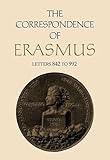The Correspondence of Erasmus : Letters 842 to 992, Volume 6 / Desiderius Erasmus.
Material type: TextSeries: Collected Works of Erasmus ; 6Publisher: Toronto : University of Toronto Press, [1982]Copyright date: ©1982Description: 1 online resource (472 p.)Content type:
TextSeries: Collected Works of Erasmus ; 6Publisher: Toronto : University of Toronto Press, [1982]Copyright date: ©1982Description: 1 online resource (472 p.)Content type: - 9780802055002
- 9781442681026
- 199/.492
- PA8511.A5 E55 1974 v.6
- online - DeGruyter
| Item type | Current library | Call number | URL | Status | Notes | Barcode | |
|---|---|---|---|---|---|---|---|
 eBook
eBook
|
Biblioteca "Angelicum" Pont. Univ. S.Tommaso d'Aquino Nuvola online | online - DeGruyter (Browse shelf(Opens below)) | Online access | Not for loan (Accesso limitato) | Accesso per gli utenti autorizzati / Access for authorized users | (dgr)9781442681026 |
Browsing Biblioteca "Angelicum" Pont. Univ. S.Tommaso d'Aquino shelves, Shelving location: Nuvola online Close shelf browser (Hides shelf browser)

|

|

|

|

|

|

|
||
| online - DeGruyter The Correspondence of Erasmus : Letters 298 to 445, Volume 3 / | online - DeGruyter The Correspondence of Erasmus : Letters 446 to 593, Volume 4 / | online - DeGruyter The Correspondence of Erasmus : Letters 594 to 841, Volume 5 / | online - DeGruyter The Correspondence of Erasmus : Letters 842 to 992, Volume 6 / | online - DeGruyter The Correspondence of Erasmus : Letters 993 to 1121, Volume 7 / | online - DeGruyter The Correspondence of Northrop Frye and Helen Kemp, 1932-1939 : Volume 2 / | online - DeGruyter The Correspondence of Northrop Frye and Helen Kemp, 1932-1939 : Volume 1 / |
restricted access online access with authorization star
http://purl.org/coar/access_right/c_16ec
This volume covers a number of significant events and issues in Erasmus' life and in the history of his times. He travels on horseback from Louvain to Basel to assist his publisher and friend Johann Froben during the crucial phases in the production of his revised New Testament, the edition that he feels will be his lasting contribution to the scholarly foundations of the Christian faith. Once it is in teh hands of the public he feels he will be able to face the approach of old age more calmly. On the return journey to Louvain he falls gravely ill from what is diagnosed as bubonic plague, but recovers ina month and convalesces in the home of another publisher-friend, Dirk Martens.International politics continue to capture his attention. Requests for funds in support of a papal crusade against the Turks arouse the flames of German national sentiment. With the death of Maximilian I, friends of Erasmus such as Richard Pace, Ulrich von Hutten, and Guillaume Budé are involved in diplomatic negotiations concerning the imperial succession. When Prince Ferdinand arrives from Spain and requires a tutor, the question of Eramus' own return to active court duties is raised.After the appearance of Luther's Ninety-five Theses on indulgences, purgatory, and papl authority, the question arises among conservatives whether Erasmus' work too is a threat t the traditional ways of the church and society. For the time being, Erasmus is prepared to comment Luther and defend the latter's right to be critical of the church. Erasmus' overriding conviction at this point is that he and Luther are both part of the great intellectual and spiritual renewal that is taking place in so many parts of Europe. As Luther's appearance lends a new kind if spiritual and patriotic vigour to German humanism, the cult of Erasmus-Erasmus the fellow German-becomes an integral part of that new enthusiasm, with Saxony and its elector, Frederick the Wise, at its center.
Mode of access: Internet via World Wide Web.
In English.
Description based on online resource; title from PDF title page (publisher's Web site, viewed 01. Nov 2023)


